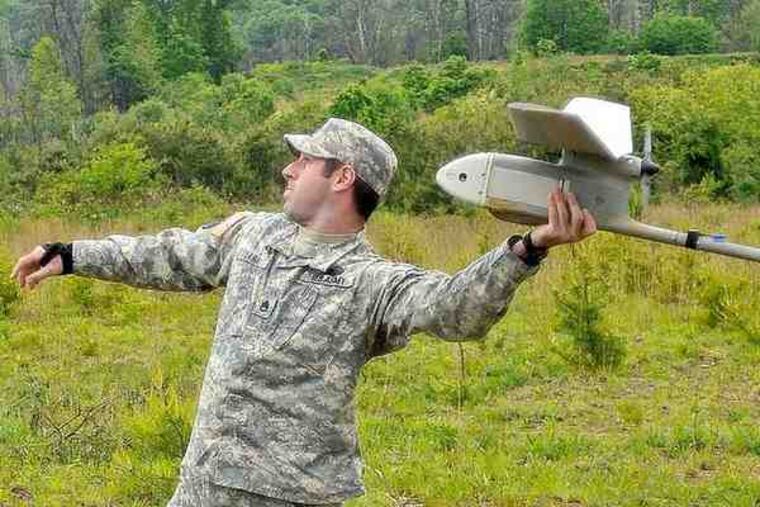Drones over Pennsylvania

The drones are used for training and equipped with several cameras, including one with infrared capabilities, according to the FAA authorization.
Staff Sargent Matt Jones, a spokesman for the Pennsylvania National Guard, said last week that the drones – known as "The Shadow" – are used exclusively for training purposes. They never carry weapons and never leave the airspace over the fort, where training exercises take place, he said.
"It's the same as flying the Apache (a military helicopter) around, but we don't load it with Hellfire missiles and fly it over your house," Jones said.
The training missions never include recording data from the drones' cameras, he said, as they are only meant to help soldier learn to use the devices in preparation for overseas deployment.
The drone is authorized to operate between 7 a.m. and midnight on weekdays any time of the year, according to FAA certification. Flights are estimated at between five and six hours each.
Officially known as an RQ-7B Shadow, the drone is manufactured by Maryland-based AAI Corporation, a defense contractor. It is billed as a tool for "reconnaissance, surveillance, targeting, and assessment," according to AAI Corporation's website.
The entire system of four aircraft with trucks, launcher and other vital components costs roughly $15 million, Jones said.
The Pennsylvania National Guard also owns smaller drones known as "Ravens" which are small enough to be launched by hand, Jones said.
But the National Guard may not be the only group in Pennsylvania using drone technology.
Penn State University was included on a list of public institutions that requested Federal Aviation Administration permission to fly a drone, according to a list published by the Electronic Frontier Foundation, a think tank based in San Francisco, which obtained detailed records of FAA permits for drones.
Last month, the Penn State request was denied by the FAA, according to multiple media reports. A professor at the school had hoped to use a drone as part of a research project on albatrosses.
The issue of drones came to the forefront of national politics last week when Sen. Rand Paul, R-Ky., lead a 12-hour filibuster on the Senate floor Wednesday to criticize the United States' use of the unmanned vehicles in the War on Terror.
Allie Bohm, an advocacy and policy strategist for the American Civil Liberties Union, or ACLU, said privacy laws need to be strengthened and updated to allow the positive aspects of drone technology to be used while limiting their potential for violating privacy laws.
"We want to make sure they're not used for indiscriminate, mass surveillance," she said.
FAA regulations keep drones out of conventional airspace, and thus out of densely populated areas, but that could be changing soon. Congress has ordered the FAA to come up with looser drone regulations by 2015.
The same legislation during the last session attracted only five sponsors and did not move out of committee.
Bohm said requiring a warrant is an "excellent standard" for drone surveillance.
Arizona, Montana and North Dakota have similar bills to require a warrant for drone surveillance that have passed at least one chamber of their state legislatures, but no states have laws requiring it.
In Virginia, a two-year moratorium on the use of drones by law enforcement has passed the legislature and is waiting for Gov. Bob McDonnell's signature.
The Pennsylvania State Police do not use drone technology, said assistant press secretary Diana Bates. She could not comment on whether the state police would pursue the use of drones in the future.
Boehm is bureau chief for PA Independent. He can be reached at Eric@PAIndependent.com